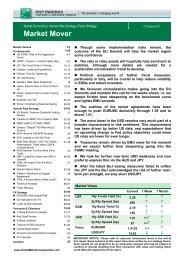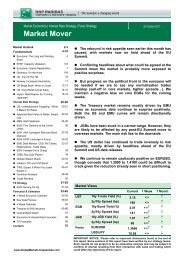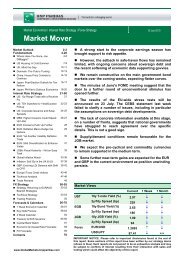Market Economics | Interest Rate Strategy - BNP PARIBAS ...
Market Economics | Interest Rate Strategy - BNP PARIBAS ...
Market Economics | Interest Rate Strategy - BNP PARIBAS ...
You also want an ePaper? Increase the reach of your titles
YUMPU automatically turns print PDFs into web optimized ePapers that Google loves.
Key Data Preview<br />
65<br />
60<br />
55<br />
50<br />
45<br />
40<br />
35<br />
30<br />
Chart 3: Eurozone PMI by Sector<br />
Services<br />
Manufacturing<br />
99 00 01 02 03 04 05 06 07 08 09 10<br />
Source: Reuters EcoWin Pro<br />
Jan (f) Dec Nov Oct<br />
Manufacturing 57.1 57.1 55.3 54.6<br />
Services 54.2 54.2 55.4 53.3<br />
Composite 55.5 55.5 55.5 53.8<br />
Key Point:<br />
PMI data will again highlight divergence between the<br />
core and peripheral economies.<br />
<strong>BNP</strong> Paribas Forecast: Internal Divergence<br />
Eurozone: ‘Flash’ PMIs (January)<br />
Release Date: Monday 24 January<br />
Activity in manufacturing has re-accelerated since autumn<br />
last year, with the eurozone PMI for the sector increasing<br />
in each of the three months to December.<br />
The levels of the headline index and the main sub-indices<br />
for orders and output have risen back towards their cycle<br />
highs of spring 2009. The employment sub-index has also<br />
improved markedly, rising to its highest level in more than<br />
a decade (to 53.8 in December).<br />
This strength, however, has been driven largely by robust<br />
activity in the ‘core’ countries and in Germany in particular.<br />
The latter’s headline, output and orders sub-indices have<br />
all risen back above the 60 level, consistent with unusually<br />
strong growth rates in the manufacturing sector.<br />
The growth rates signalled by the peripheral countries’ PMI<br />
data, while improving, have been much less elevated. The<br />
service sector PMIs in the peripheral countries have been<br />
deteriorating, consistent with weak consumer demand, in<br />
turn due to fiscal austerity programmes.<br />
In Germany, in contrast, the service sector has been doing<br />
well, as the expansion becomes more broad based. This<br />
has been insufficient to prevent the service sector PMI for<br />
the eurozone as a whole from losing ground.<br />
The input price sub-index for the manufacturing PMI in the<br />
eurozone has risen sharply, due to commodity price rises.<br />
Output prices have also been rising, but by less.<br />
Chart 4: UK GDP vs Composite CIPS<br />
Source: INSEE, Reuters EcoWin Pro<br />
Q4 (f) Q3 Q2 Q1<br />
GDP % q/q 0.3 0.7 1.1 0.3<br />
GDP % y/y 2.4 2.7 1.6 -0.3<br />
Ind Prod % q/q 0.4 0.6 1.1 1.0<br />
Services % q/q 0.2 0.5 0.6 0.3<br />
Key Point:<br />
We expect a sluggish 0.3% q/q pace of expansion,<br />
held back to a large extent by snow-related<br />
disruption.<br />
<strong>BNP</strong> Paribas Forecast: Sluggish<br />
UK: GDP (Prel Q4)<br />
Release Date: Tuesday 25 January<br />
We expect GDP growth to decelerate to 0.3% q/q during<br />
Q4, held back by snow-related disruption. Industrial<br />
production growth had been solid in the first two months of<br />
the quarter. However, we expect a weak December<br />
reading for manufacturing to dampen the quarterly<br />
average. Business services output growth ground to a halt<br />
during Q3, consistent with the dip in the services sector<br />
CIPS. We expect a slight improvement during Q4, though<br />
again a weak December is likely to hold back the quarterly<br />
average.<br />
Manufacturing and business services accounted for only<br />
0.1% point of the 0.7% q/q expansion during Q3. The bulk<br />
of the growth was accounted for by construction and<br />
government output. We expect construction to continue to<br />
decelerate from the super-strong pace recorded in mid-<br />
2010. Similarly, distribution output is likely to have suffered,<br />
not least given the poor performance of retail sales during<br />
Q4.<br />
Overall, we expect a sluggish pace of expansion though<br />
dampened to a large extent by temporary weather related<br />
influences. These should reverse during Q1 helping growth<br />
to reaccelerate. However, at that stage the impact of fiscal<br />
tightening should prevent growth from rebounding<br />
drastically.<br />
<strong>Market</strong> <strong>Economics</strong> 20 January 2011<br />
<strong>Market</strong> Mover<br />
72<br />
www.Global<strong>Market</strong>s.bnpparibas.com

















